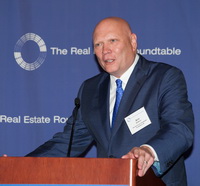This week U.S. Senators Pat Toomey (R-PA) and Doug Jones (D-AL) introduced bipartisan legislation, the Restoring Investment in Improvements Act (S. 803), to correct a mistake in the Tax Cuts and Jobs Act that lengthened the cost recovery period for qualified improvement property (QIP).
 |
U.S. Senators Pat Toomey (R-PA) and Doug Jones (D-AL) introduced bipartisan legislation, the Restoring Investment in Improvements Act ( S. 803 ), to correct a mistake in the Tax Cuts and Jobs Act that lengthened the cost recovery period for qualified improvement property (QIP). |
 |
Roundtable President and CEO Jeffrey D. DeBoer applauded the Senators bipartisan legislation introduced this week. “The Restoring Investment in Improvements Act ( S. 803 ) introduced by Senators Toomey and Jones is a simple and straightforward technical correction to the Tax Cuts and Jobs Act," he said. |
On Thursday, Treasury Secretary Steven Mnuchin told reporters that he has discussed fixing technical errors in the 2017 tax law with congressional leaders on both sides. “This is something we’re very interested in doing. There’s a lot of demand,” he said following his testimony before the Senate Finance Committee. (Bloomberg, Mar. 14)
The Roundtable joined the National Association of Home Builders (NAHB) and National Federation of Independent Business (NFIB) today, in an amicus brief requesting the nation’s highest court to accept a case that addresses significant property rights issues.
 |
The Roundtable joined the National Association of Home Builders (NAHB) and National Federation of Independent Business (NFIB) today, in an amicus brief requesting the nation’s highest court to accept a case that addresses significant property rights issues. |
The Supreme Court will decide whether (or not) it accepts the Love Terminal case likely after its next term starts in October 2019. If it does, briefing on the merits would take place next fall, and a decision would be expected by June 2020.